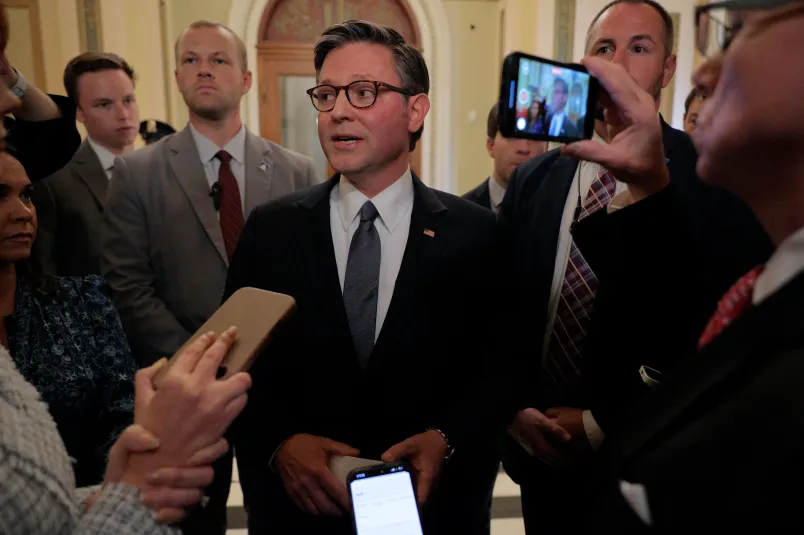By Emine Yücel
Copyright talkingpointsmemo

House Republicans passed their “clean” seven-week continuing resolution (CR) Friday morning on a largely party line 217-212 vote, setting up the Senate for a stalemate over government funding similar to what happened in March.
Reps. Thomas Massie (R-KY) and Victoria Spartz (R-IN) broke from the Republican caucus and voted against the short-term stopgap measure, which would keep the government funded through Nov. 21. Rep. Jared Golden (D-ME) voted to support the Republican stopgap.
House Democrats largely stuck together, opposing the GOP CR, which they point out was written without bipartisan negotiations and does not include any of the health care provisions that Democrats have been demanding in exchange for their support. Specifically, Democrats in both chambers have been publicly pushing for a deal that would extend the Affordable Care Act’s (ACA) enhanced premium tax credits — which are set to expire at the end of 2025 — in exchange for their votes on a potential CR.
Democrats’ have rolled out an alternative CR, which includes a series of health care provisions, including an extension of the Obamacare subsidies, and language to fight back against the Trump White House’s lawless impoundments and pocket rescissions — threats to Congress’ power of the purse that loom over the entire budgeting process.
Ahead of the floor vote, House Minority Leader Hakeem Jeffries (D-NY) said Democrats won’t support a CR that “continues to gut the health care of everyday Americans.”
“House Democrats are clear. We don’t work for Donald Trump. We don’t work for JD Vance … We work for the American people,” Jeffries said on the Capitol steps as a large portion of the House Democratic caucus stood behind him.
The Senate is expected to take up both the Republican and Democratic versions of the short-term stopgap on Friday. Both are expected to fail, as any government funding legislation requires 60 votes in the upper chamber. That means Senate Republicans — who hold the majority, with 53 votes — will need several Democrats to join them in supporting a bill to avoid a government shutdown. So far, only one — Sen. John Fetterman (D-PA) — has indicated he would support the GOP stopgap.
The impasse the Senate is left with is similar to what happened last March: Senate Republicans, who are in control of the upper chamber, will either have to negotiate with Senate Democrats to get the votes they need or risk a government shutdown.
Democrats’ alternative CR gives a roadmap for, in theory, what they might have to agree to to attract Democratic votes. Democrats can and will try to negotiate on individual amendments like the ACA subsidies — despite Republican leadership saying it is a non-starter for them.
Senate Minority Leader Chuck Schumer and other Democrats continue to push for Republicans to engage in bipartisan negotiations, which Democrats claim Republican leadership has avoided so far, despite their repeated calls for it.
“Look, Donald Trump is heading the show here,” Schumer said, per Punchbowl. “And he has said, ‘Don’t negotiate with the Democrats. We don’t need them.’ There’s one of two things. Either he doesn’t understand the Senate — even in its most rudimentary way — or he doesn’t know how to count. The only good way to get this done is a bipartisan negotiation.”
Schumer, who got massive pushback from the Democratic base in March for eventually supporting the Republican CR in order to avoid a shutdown, is taking a much different path this time around. The minority leader has suggested he is prepared to risk a shutdown to protect the principles Democrats’ are fighting for. Schumer has also been working closely with the House Minority Leader Jeffries in order to keep Democrats united and on the same message.
“We believe the American people will understand that they are causing a shutdown, again, by not being [bipartisan], by not wanting to do anything on health care at all, and by Trump,” Schumer said, referring to President Trump’s recent remarks instructing congressional Republicans to “don’t even bother dealing with” Democrats.
“We want changes in health care to undo the damage they have done, and we want to make sure if we pass any appropriations bills, they can’t just undo it unilaterally with Vought, OMB and rescissions. We’ve made that clear for months, and we’ve been united for months. Our whole caucuses are united, just as we were all united,” Schumer said later in the Punchbowl interview.
Democratic messaging has leaned on the fact that Republicans are in charge of the House, the Senate and the White House. They need our votes to fund the government for the next fiscal year and avoid a shutdown, Democrats point out. So Republicans have to come to the table and negotiate with us.
“Government works through negotiation and compromise. So far, they’ve been unwilling even to discuss the CR,” Sen. Richard Blumenthal (D-CT) told TPM on Thursday. “There’s a deadline for those premium tax credits, the subsidies that keep health insurance affordable, which expire at the end of the year … That’s an imperative we cannot ignore by approving the CR and saying we’ll deal with it in the next CR or the next budget.”
“We can’t wait for some time in the future,” Blumenthal added. “Real lives are going to be put in jeopardy when people become sick and they can’t get health care. They can’t sort of postpone their sickness for us to do another CR.”
Sen. Ron Wyden (D-OR) agreed, saying they have heard “nothing” from Republicans.
“Nothing that speaks to what the central problem is,” Wyden told reporters at the Senate basement. “They have passed bills that are raising the health care costs for Americans and raising the health insurance premium for Americans. This is going to take real action to do something about it and it’s not going to happen in one quick snap of your fingers, but at least you ought to get started. And I don’t see any evidence of wanting to do that.”
House Republican leadership are reportedly discussing a plan to not bring the House back into session until after the shutdown deadline to effectively jam and strong-arm the Senate into either voting for the CR they passed or accepting a shutdown.
Lawmakers have until the end of September to find a way to fund the government or prepare for a government shutdown.
“Hopefully, Republican leadership will sit down and talk with us,” Blumenthal told TPM. “So far they’ve been unwilling to do it. And the reason is Donald Trump told them not to do it.”
“I don’t think he understands what the urgency is of health care for Americans,” Blumenthal said of the president. “He’s lived in a world where everything has been given to him but the real life story for Americans is health insurance is vital to their dealing with sickness and suffering.”



